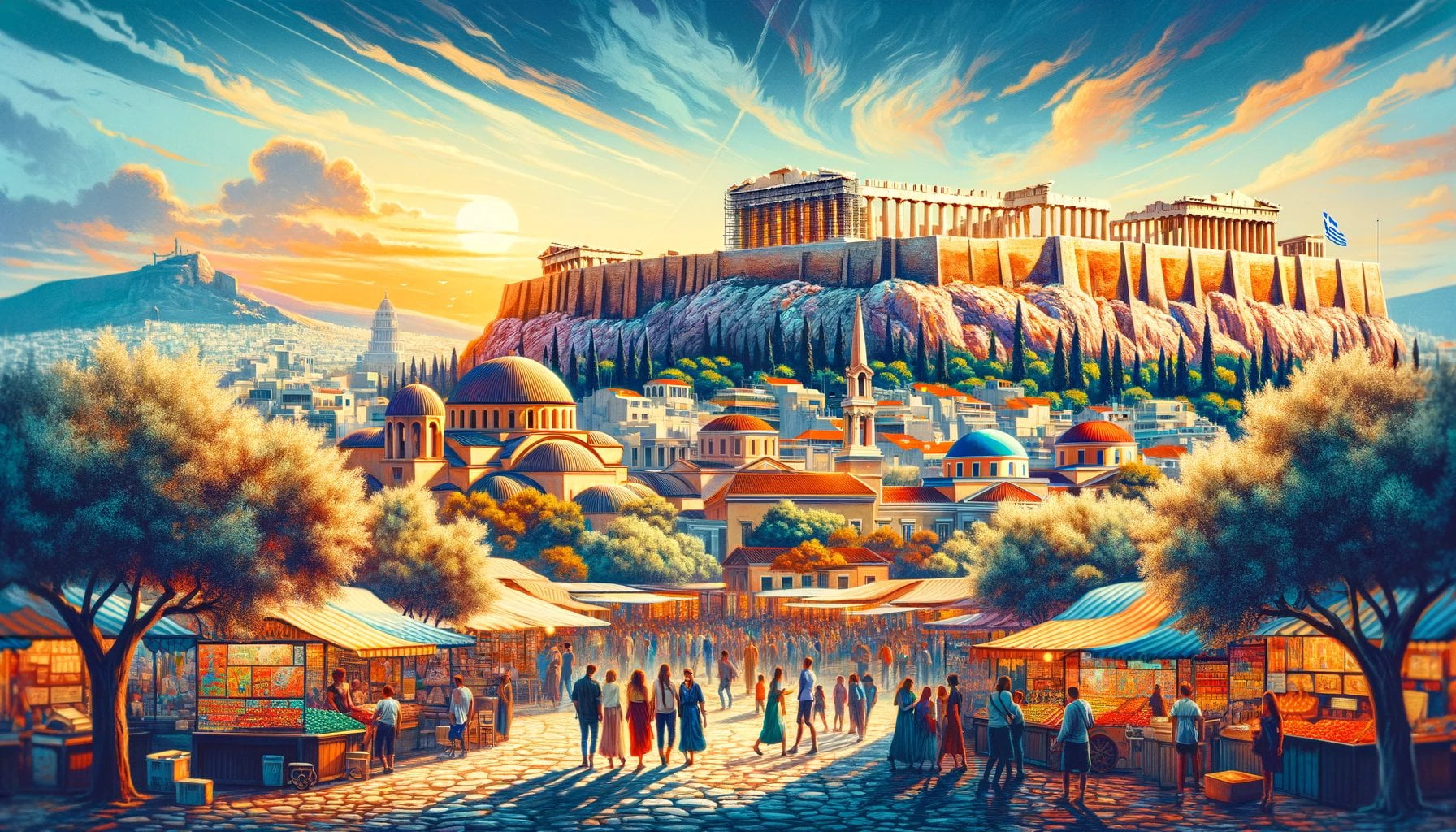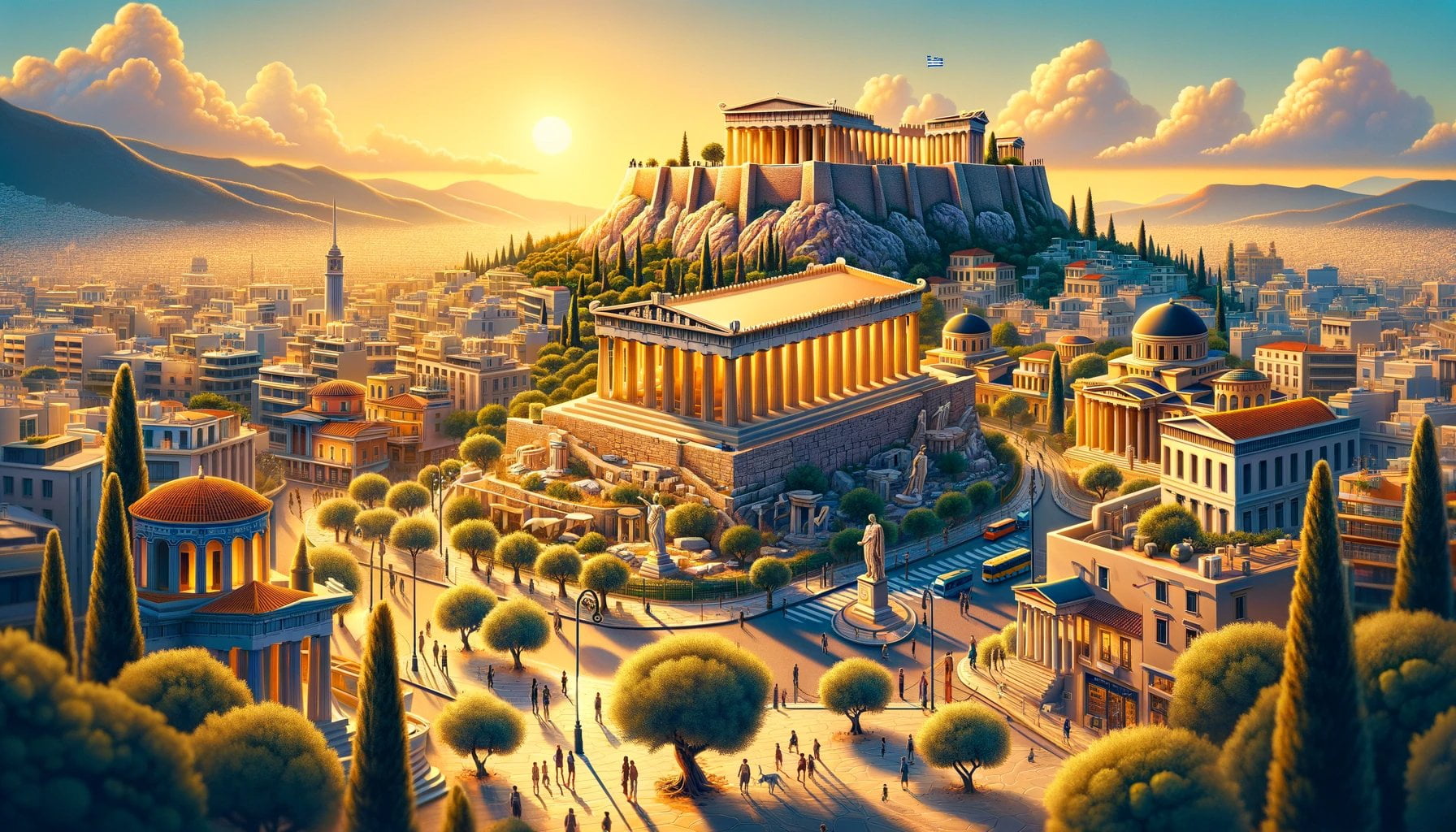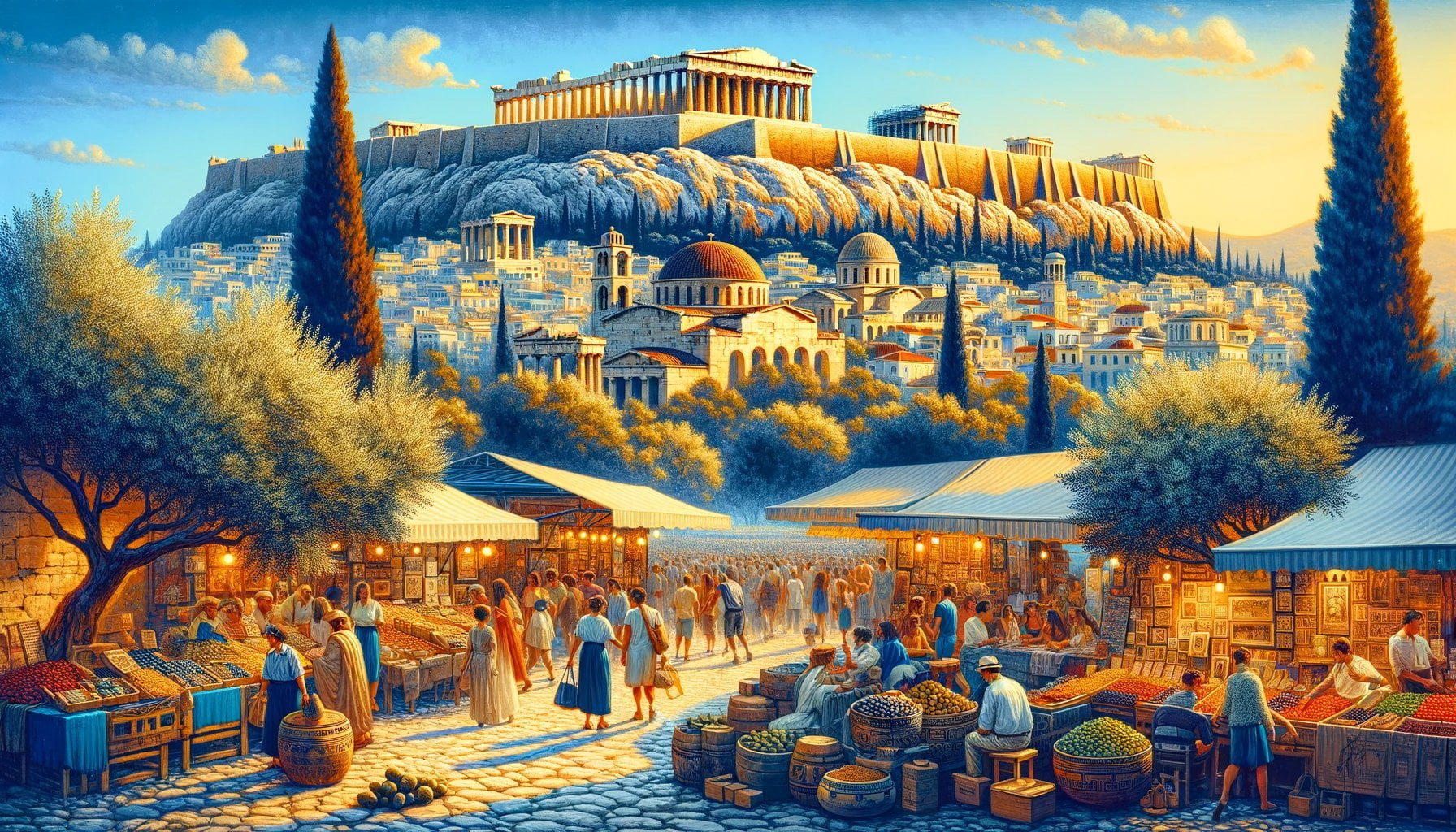Discover Fascinating Fun Facts About Athens, Greece: Delve into the enchanting world of Athens, Greece, as we uncover a treasure trove of captivating fun facts about this ancient city. From its rich history and breathtaking architecture to its vibrant culture and mouthwatering cuisine, Athens is a destination like no other. Join us on a journey through time and unveil the hidden gems that make Athens a must-visit for any intrepid traveler seeking an authentic experience. Prepare to be amazed by the fascinating secrets that await in this remarkable city.

Key Takeaways:
– Athens is Europe’s oldest capital city and one of the oldest continuously inhabited cities in the world.
– The ancient Olympic games were never held in Athens, but the modern Olympic games were revived there in 1896.
– Athens was the birthplace of democracy, with the concept introduced there.
– The marathon was named after a long run to Athens in 490 B.C. to deliver news of victory over the Persians.
– Athens was the first European Capital of Culture, chosen in 1985.
– The Acropolis in Athens is one of Greece’s 18 UNESCO World Heritage Sites and includes the iconic Parthenon temple.
– Ancient Athenians had a mostly vegetarian diet due to their belief that animals had souls.
– The Acropolis was almost considered a seventh world wonder due to its magnificent structures and ancient Greek architecture.
– Athena won a competition with Poseidon to become the patron god of Athens by offering the city an olive tree.
– Athens takes its name from its patron goddess, Athena, to honor and pay tribute to her qualities of wisdom, courage, and strategic warfare.
Fun Facts About Athens, Greece
Athens, Greece, a city steeped in ancient history and remarkable culture, holds a treasure trove of captivating and surprising facts. Let’s embark on a journey through time and uncover some intriguing fun facts about this enchanting destination.
Europe’s Ancient Capital
Athens proudly wears the crown as Europe’s oldest capital city and is among the world’s oldest continuously inhabited cities. This vibrant metropolis has witnessed countless centuries of triumphs, setbacks, and transformations, making it a living testament to the resilience of human civilization.
The Ancient Olympic Games
While the ancient Olympic games were not held in Athens, this mesmerizing city played a pivotal role in reviving the modern Olympic games. In 1896, after a hiatus of more than 1,500 years, Athens hosted the first modern Olympic games, igniting a legacy that continues to unite nations through sport and camaraderie.
The Birthplace of Democracy
Athens proudly claims the title of the birthplace of democracy. It was here that the concept of democracy was introduced, empowering even common male citizens to participate in political decision-making. Athenians had the power to banish politicians they deemed unworthy, creating a unique democratic system that shaped the course of history.
The Marathon’s Origins
The famous marathon race owes its name and origin to an impressive feat of ancient Athens. In 490 B.C., a courageous soldier named Pheidippides ran from the city of Marathon to Athens, covering a distance of approximately 26 miles, to deliver the joyous news of victory over the Persians. This awe-inspiring feat has forever immortalized the city and the marathon race.
Champion of Culture
In 1985, Athens was designated as the first European Capital of Culture. This prestigious title is awarded annually, highlighting a city’s cultural heritage and fostering tourism. Athens, with its rich history and vibrant arts scene, proved to be not just a worthy recipient but an exemplary ambassador of European culture.
The Acropolis and UNESCO Heritage
One of Greece’s most iconic landmarks, the Acropolis, resides proudly in Athens. This site, one of the country’s 18 UNESCO World Heritage Sites, encapsulates the grandeur of ancient Greek civilization. Standing tall is the magnificent Parthenon temple, a testament to the architectural and engineering mastery of the ancient Greeks.
A Vegetarian Journey
In ancient Athens, meat consumption was surprisingly rare. The Athenians believed that animals possessed souls, leading to a predominantly vegetarian diet. This unique cultural belief shaped the culinary traditions of the city, emphasizing flavorsome vegetarian dishes that still delight palates today.
Almost a Wondrous Wonder
The Acropolis, with its awe-inspiring structures and unwavering grandeur, nearly secured its place as the seventh wonder of the world. The architectural marvels found within the Acropolis, including the Parthenon, stand as a testament to the ingenuity and artistic prowess of ancient Greek civilization.
The Patronage of Athens
A beautiful myth surrounds the patronage of Athens. According to legend, Athena and Poseidon fought for the honor of becoming the city’s patron god. In their competition, Athena emerged victorious by bestowing upon the city the precious gift of an olive tree. This symbolic gesture forever bound Athens to the goddess of wisdom, courage, and strategic warfare.
A City Named in Honor
As one might expect, Athens takes its name from its esteemed patron goddess, Athena. The city’s nomenclature pays homage to the goddess, honoring her significance in Greek mythology and attributing wisdom, strength, and strategic prowess to the vibrant heart of Athens.
So there you have it—these captivating fun facts about Athens, Greece showcase the majesty, historical significance, and cultural richness of this remarkable city. Whether you’re exploring its ancient ruins, indulging in delectable cuisine, or immersing yourself in its vibrant arts scene, Athens never fails to enchant and inspire visitors from around the globe.
Here are some fun facts about Madison, Wisconsin. Did you know that Madison is home to the University of Wisconsin-Madison, a prestigious research institution? Explore more interesting facts about Madison here!
Interested in learning fun facts about UC Berkeley? Did you know that UC Berkeley is the oldest of the ten campuses in the University of California system? Discover more fascinating facts about UC Berkeley here!
Did you know that Lake Victoria is the largest lake in Africa and the second-largest freshwater lake in the world? Dive into more exciting facts about Lake Victoria here!
The Olympic Games Connection
From the ancient Greeks’ dedication to physical prowess and the worship of their gods, the Olympic Games emerged as a testament to their devotion. Athens, the vibrant city steeped in history and culture, played a pivotal role in the ancient Olympic Games. In this article, we delve into the fascinating connection between Athens and the immortalized athletic event.
Ancient Athens Olympics: A Glimpse into the Past
Picture this: a stadium packed with at least 40,000 spectators, all reveling in the thrill of the Games. In ancient Athens, the Olympics were not just about competing; they were a religious celebration dedicated to Zeus, the king of the gods. Over five days, athletes showcased their athletic prowess in a wide range of disciplines. From the classic running, jumping, and throwing events to the captivating chariot racing, boxing, wrestling, and pankration, the Games offered something for everyone.
A Hero’s Welcome: Olympic Victors and Leafy Laurels
While today’s athletes aspire to gold, silver, and bronze medals, ancient Olympic victors received something far more symbolic. Instead of medals, they were adorned with a wreath made of intertwined leaves. Triumphantly returning to their hometowns, these victorious athletes were met with a hero’s welcome. Their achievements weren’t just personal; they brought glory to their city and were seen as being favored by the gods.
An Inclusive Competition with Sacred Origins
The Olympics were a meeting ground for Greek city-states and kingdoms. Athletes from any Greek city-state were welcome to participate as long as they met the entrance criteria. The games were inclusive, open to freeborn Greek men from various regions. Interestingly, women chariot owners could also achieve victory. This inclusivity showcased the unifying power of the Games as competitors left behind their regional differences to compete for honor and pride.
An End to an Era: The Ban on Ancient Olympics
As the centuries rolled on, the ancient Olympics eventually faced their demise. In 393 AD, Theodosius, the Roman Emperor at the time, made the decision to ban the Games. Theodosius aimed to suppress pagan rituals and curtail the influence of ancient Greek traditions. This ban marked the end of an era, and the Olympics lay dormant for over 1,500 years until their revival in a different form.
Key Takeaways:
– The ancient Athens Olympics were a religious festival dedicated to Zeus, the king of the gods.
– Winners were awarded wreaths of leaves instead of gold, silver, and bronze medals.
– Athletes competed for the glory of their city and were seen as being favored by the gods.
– The ancient Olympics were open to freeborn Greek men from any Greek city-state or kingdom.
– Women chariot owners could also be victorious.
– The Games were banned by Theodosius in 393 AD, leading to a long hiatus until their modern revival.
Olympics.com: The Ancient Olympic Games
ThoughtCo: Ancient Olympics Origins and History
The City of Street Art
Welcome to Athens, Greece, a city known for its rich history, vibrant culture, and… street art? That’s right! In recent years, Athens has emerged as a street art destination, attracting local and international artists who have chosen to decorate the city with their captivating creations. From colorful murals to intricate graffiti tags, Athens’ street art scene is a feast for the eyes. Let’s dive into the world of street art in Athens and uncover some fascinating facts.
Neighborhoods Bursting with Creativity
When exploring Athens’ street art scene, there are a few neighborhoods you simply can’t miss. Psyri, Omonoia, Metaxourgeio, and Exarcheia all boast impressive displays of urban art. These areas have become hotspots for street artists, offering an open canvas for their creative expressions. As you wander through the streets, keep an eye out for striking murals, eye-catching paste-ups, and thought-provoking graffiti.
A Unique Street Art Culture
What sets Athens apart is its ability to assimilate cultural trends and adapt them to its own character. The city’s street art scene reflects this perfectly, blending Greek and international influences to create a unique artistic atmosphere. It’s a contemporary twist on Athens’ ancient history, where the walls of the city become a canvas for modern self-expression.
The Euro Crisis Effect
The euro crisis that hit Greece in recent years had an unexpected impact on Athens’ street art scene. As the city faced economic hardships, street artists found solace in their art. The walls became a medium for expressing frustration, hope, and resilience. Athens’ street art scene experienced a burst of creative energy, with artists using their work to reflect and comment on the socio-political issues plaguing the city and the nation.
Walking Tours and Galleries
To truly immerse yourself in the vibrant world of Athens’ street art, consider taking a street art and graffiti tour. Local organizations offer guided tours that take you through the city’s most impressive urban art hotspots. It’s a chance to learn more about the artists, their inspirations, and the stories behind their work.
If you prefer a more curated experience, head to Gallery Sarri12. This popular gallery showcases street art and offers a deeper insight into the artistic processes behind the creations. Here, you can explore the works of established and emerging street artists, gaining a deeper appreciation for the talent that fills Athens’ walls.
Key Takeaways:
- Athens has emerged as a street art destination, attracting both local and international artists.
- Neighborhoods such as Psyri, Omonoia, Metaxourgeio, and Exarcheia are known for their vibrant street art scenes.
- The city’s street art reflects a unique blend of Greek and international influences.
- Athens’ street art scene experienced a surge of creativity during the euro crisis, becoming a platform for social and political expression.
- Street art and graffiti tours, as well as the Gallery Sarri12, offer opportunities to explore and engage with Athens’ street art culture.
Citations:
1. Street Art In Athens – Where To See The Best Urban Art – Real Greek Experiences
2. A Street Art Guide To Athens, Greece – Trip101
The delicious Greek cuisine
Greek food is a treasure trove of flavors and traditions that have been passed down through generations. From the ancient civilizations that shaped the country’s culinary heritage to the modern-day delights that grace the tables of Athens, Greek cuisine is a delicious journey through time.
Greek Cuisine is over 4,000 Years Old
Imagine taking a bite of history with every mouthful of Greek food. The roots of Greek cuisine go back over 4,000 years, making it one of the oldest culinary traditions in the world. Throughout its long history, Greek food has evolved, been influenced by various cultures, and developed into the diverse and flavorful cuisine we know today.
Greeks Love Their Olive Oil
The secret ingredient behind the rich, distinct flavors of Greek food is none other than olive oil. Greeks have mastered the art of olive oil production and use it generously in their dishes. It’s not just a cooking ingredient; it’s the heart and soul of Greek cuisine. From drizzling it over salads to dipping fresh bread into it, olive oil adds a unique depth of flavor to every bite.
In Greece, Feta Cheese Rules
Feta cheese is the king of Greek cheeses. Made from sheep’s milk or a combination of sheep’s and goat’s milk, feta cheese holds a special place in Greek cuisine. Its tangy, salty taste and crumbly texture make it the star of popular dishes like Greek salads, spanakopita, and moussaka. The delightful combination of feta cheese with other ingredients is a culinary treat that every food lover must experience.
The Greek Diet Is One of the Healthiest on Earth
Greek food isn’t just delicious; it’s also incredibly healthy. The Greek diet is widely regarded as one of the healthiest in the world. It emphasizes fresh fruits and vegetables, whole grains, legumes, lean proteins, and, of course, the golden elixir of olive oil. This wholesome combination has been linked to numerous health benefits, including a reduced risk of heart disease and increased longevity.
Roman, Persian, and Ottoman Influences
Greek cuisine is a culinary tapestry woven with influences from different civilizations. Throughout its history, Greece has been influenced by the Romans, Persians, and Ottomans, among others. Each culture brought its own ingredients, cooking techniques, and flavors, leaving an indelible mark on Greek food. This fusion of culinary traditions is what gives Greek dishes their unique and irresistible taste.
Meals In Greece Are Social Events
In Greece, eating is more than just a means to satiate hunger; it’s a cherished social event. Meals are an opportunity for family and friends to come together, share stories, and create lasting memories. Gathered around a table filled with an array of dishes, Greeks indulge in the pleasure of good company and delightful conversations. The vibrant flavors of Greek food are best enjoyed in the company of loved ones.
Key Takeaways:
– Greek cuisine dates back over 4,000 years, influenced by various civilizations and cultures.
– Olive oil is a fundamental ingredient in Greek food, enhancing its flavors and nutritional value.
– Feta cheese is a beloved Greek cheese, used in many traditional dishes.
– The Greek diet is recognized as one of the healthiest in the world, focusing on fresh and wholesome ingredients.
– Greek cuisine has been shaped by the Romans, Persians, Ottomans, and other cultures, resulting in a diverse culinary tradition.
– Meals in Greece are not just about food; they are social events that bring people together.

FAQ
Q1: How old is Athens, Greece?
A1: Athens is Europe’s oldest capital city and one of the oldest continuously inhabited cities in the world, with a history dating back thousands of years.
Q2: Was Athens the birthplace of democracy?
A2: Yes, Athens was the birthplace of democracy. The concept of democracy was introduced in Athens, and even common male citizens had the power to banish politicians if they wanted to.
Q3: What is the significance of the Acropolis in Athens?
A3: The Acropolis is a symbol of ancient Greek civilization and is one of Greece’s 18 UNESCO World Heritage Sites. It includes the iconic Parthenon temple and is considered a testament to ancient Greek architecture and engineering.
Q4: How did Athens become the first European Capital of Culture?
A4: Athens was chosen as the first European Capital of Culture in 1985. This title is awarded to a city every year to showcase its cultural heritage and promote tourism. Athens was selected due to its rich history, vibrant culture, and contributions to the arts.
Q5: What is the origin of the marathon race?
A5: The marathon race was named after a long run to Athens in 490 B.C. when a soldier named Pheidippides ran from the city of Marathon to Athens to deliver news of victory over the Persians.
- China II Review: Delicious Food & Speedy Service - April 17, 2025
- Understand Virginia’s Flag: History & Debate - April 17, 2025
- Explore Long Island’s Map: Unique Regions & Insights - April 17, 2025
















